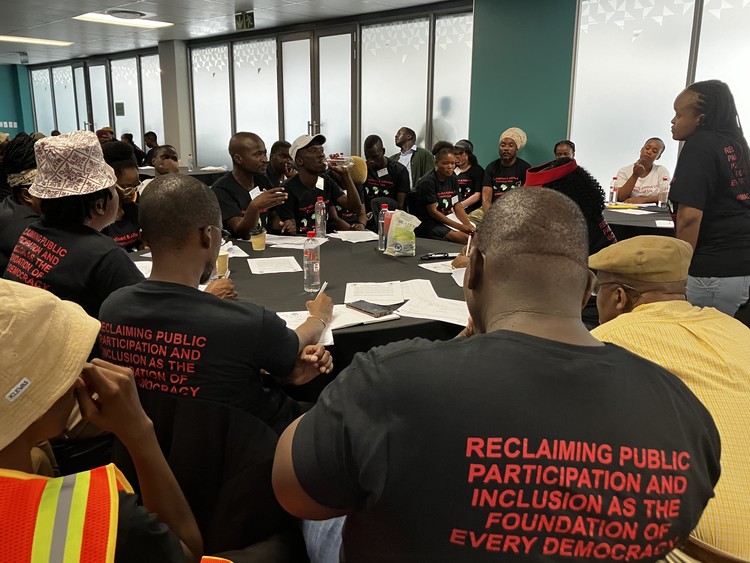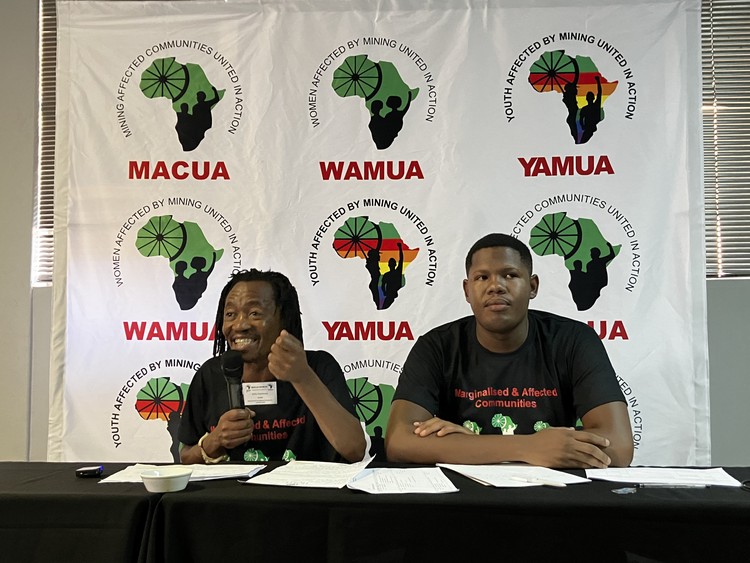Communities demand more benefits from mines in their towns
About 200 people attended a summit hosted by Mining Affected Communities United in Action in Pretoria
Residents of communities affected by mining activities across the country gathered in Pretoria for a summit on Thursday. They broke into smaller groups to share specific issues which included the health and environmental impact of mines, and the lack of consultation with communities by government and mining companies. Photos: Masego Mafata
- About 200 people from mining-affected communities attended the summit by Mining Affected Communities United in Action on Wednesday.
- The event coincided with the Mining Indaba underway in Cape Town this week.
- The residents are calling for more effort from the government and mining companies to develop their communities and include their voices in decision making.
People living in mining-affected communities across South Africa gathered at a summit hosted by the Mining Affected Communities United in Action (MACUA) in Pretoria on Tuesday.
Most of them are demanding that the government ensures that communities benefit meaningfully from mines established where they live.
The inaugural summit, attended by about 200 people, coincides with the Mining Indaba underway in Cape Town this week. This, according to MACUA’s national coordinator Meshack Mbangula, was no coincidence.
“While government is busy engaging only with business people about mining, the very communities that are affected by mining activities have been left out. So we are holding this summit to create a platform for communities to voice and discuss the issues they face,” he said.
Mbangula said he hoped that MACUA would not only be invited to attend the Mining Indaba, but included in the organising processes to ensure that there is a platform for communities to engage with mining companies and government.
Attendees from across the country lamented the failure of mining companies to develop communities and to create better employment opportunities. In so doing, attendees say, this is a failure to implement the Mineral and Petroleum Resources Development Act (MPRDA).
One of the aims of this Act, which came into effect in 2004, was to secure the uplifting of communities located near mines.
Nthabiseng Mahlumba, who travelled to the summit from Virginia in the Free State, said her community had barely anything to show despite several mines operating there. The few programmes in the gold mining town are not very accessible to most residents.
“Virginia is surrounded by many mines but today it is one of the poorest areas in the country,” she said.
Zethu Hlatshwayo (left) from the National Association of Artisanal Miners and David Nene (right) from the MACUA advice office speaking about challenges faced by artisanal miners and the communities within which they work.
Mahlumba said their high unemployment rate was frustrating to community members who are also bearing the brunt of the mines’ environmental degradation.
Attendees from other mining-affected communities also voiced similar challenges to Mahlumba.
Yolanda Dyantyi is an activist who spoke during a panel discussion. She comes from Guba Hoek — a rural coal mining community — which only has one “dilapidated high school” serving the community. Guba Hoek is located in Indwe where the Molteno-Indwe coal field is situated.
Other issues discussed included how women and children were most affected by the issues in mining-affected communities. These include a lack of prioritising women in social and labour plans.
Rebecca Selomo from Mogalakwena in Limpopo said it was important for spaces such as the summit to be used for discussing strategies for all communities affected by mining to tackle the challenges they face.
“We need to understand the power that we have in making sure that our issues are addressed. My expectation of this summit is to ensure that we come up with a united way of dealing with our issues,” she said.
The summit will culminate with a march to the Department of Mineral Resources and Energy on Thursday, where attendees will hand over a memorandum of demands.
Support independent journalism
Donate using Payfast

Don't miss out on the latest news
We respect your privacy, and promise we won't spam you.
Next: UCT strike begins – support staff demand 7.5% increase for 2024
Previous: Children feel the magic of stories at World Read Aloud Day
© 2024 GroundUp. This article is licensed under a Creative Commons Attribution-NoDerivatives 4.0 International License.
You may republish this article, so long as you credit the authors and GroundUp, and do not change the text. Please include a link back to the original article.
We put an invisible pixel in the article so that we can count traffic to republishers. All analytics tools are solely on our servers. We do not give our logs to any third party. Logs are deleted after two weeks. We do not use any IP address identifying information except to count regional traffic. We are solely interested in counting hits, not tracking users. If you republish, please do not delete the invisible pixel.


